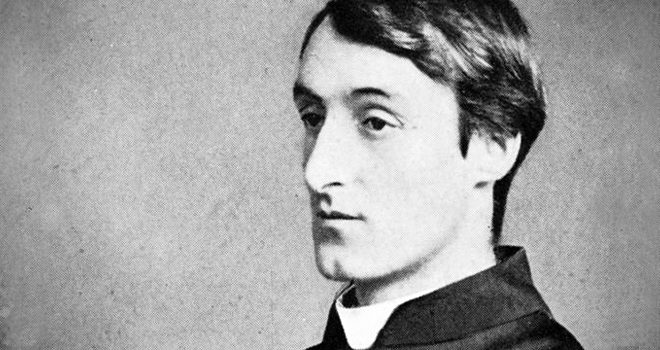Gerard Manley Hopkins
Well, she has thee for the pain, for the
Patience; but pity of the rest of them!
Heart, go and bleed at a bitterer vein for the
Comfortless unconfessed of them—
No not uncomforted: lovely-felicitous Providence
Finger of a tender of, O of a feathery delicacy, the breast of the
Maiden could obey so, be a bell to, ring of it, and
Startle the poor sheep back! is the shipwrack then a harvest, does tempest carry the grain for thee? 31
“Well, she has thee for the pain, for the /Patience”: The nun has the reward for her pain. She got ,begot, Christ. And she is rewarded with heaven, and her arrival there is celebrated with a heavenly feast. But the poet pities the rest of the nuns and others on board , (“but pity of the rest of them”.) Their “Comfortless unconfessed ” end is “bitterer”. But the poet corrects himself immediately, “No not uncomforted”. The “finger” of the opening verse of the poem ( “and dost thou touch me afresh?
Over again I feel thy finger and find thee”) reappears in this verse , (“Finger of a tender of, O of a feathery delicacy”). God’s hand is in every happening, in peace and in storm. And his ways are inscrutable. He may have used the nun as an agent of salvation of the others on the ship.But not all those on board are on the same deck,so to say. Some deserve comfort,and some bitterer testing. The storm is a kind of winnowing wind that separates the grain from the chaff, (“is the shipwrack then a harvest, does tempest carry the grain for thee?” “ shipwrack” is an old spelling, but the poet must have chosen the archaic spelling, for wrack means seaweed, which is harvested. ) “The harvest truly is great….pray ye the Lord of the harvest that he would send forth labourers into his harvest.” (Luke 10:2)
But the rest are not allowed to perish perennially. The nun now representing Virgin Mary is “a bell to, ring of it, and /Startle the poor sheep back!”. The bell is not the church bell,but a bell-buoy on the ship that sounds at the slightest swell of the sea. At the sounding of the bell, the sheep are warned to gather and return to the shepherd. And,they will, sooner or later.
I admire thee, master of the tides,
Of the Yore-flood, of the year’s fall;
The recurb and the recovery of the gulf’s sides,
The girth of it and the wharf of it and the wall;
Staunching, quenching ocean of a motionable mind;
Ground of being, and granite of it: past all
Grasp God, throned behind
Death with a sovereignty that heeds but hides, bodes but abides; 32
The poem is entering its final phase. God’s mastery over nature is emphasised , (‘master of the tides’), which recalls the opening line of the poem, “ Thou mastering me”, as well as ‘sway of the sea’. In the opening verse, God is mastering man (“me”), and here He is mastering the tempests, in the sea, and in man’s mind.
‘Who shut up the sea behind doors … when I fixed limits for it … when I said ‘This far you may come and no farther; here is where the proud waves halt’?’ (Job 38:8-11)
God is not only “The girth of it and the wharf of it”, also its boundary, (“wall”, that says thus far and no further. Thou shalt not transgress. He is the “Ground of being, and granite of it”. The foundation of man is strong, and there is no fear of floundering.
There are deaths, but one can can never know why God’s deeds are inscrutable, He is “past all /Grasp God, throned behind.” He is “a sovereignty that heeds but hides, bodes but abides”. Behind the throne, there are no answers;before the throne, there are no questions.
With a mercy that outrides
The all of water, an ark
For the listener; for the lingerer with a love glides
Lower than death and the dark;
A vein for the visiting of the past-prayer, pent in prison,
The-last-breath penitent spirits—the uttermost mark
Our passion-plungèd giant risen,
The Christ of the Father compassionate, fetched in the storm of his strides. 33
“With a mercy that outrides” is a continuation of the last sentence of the previous verse, “Death with a sovereignty that heeds but hides, bodes but abides;”. The sentence slides from Theodicy, speculation on the ways of God , to acceptance and celebration of the rebirth of Christ in the nun, now in heaven. The terror is tamed, “With a mercy”. Mercy comes in the form of “an ark /For the listener”, for those who can listen to the call of God. It could be a cry of God to the nun, “Look! Here’s a boat for your rescue ”. The reference in the verse,obviously , is to the flood described in the Genesis. God created the flood to return the Earth to its precreation times, when he wanted to re-create, or recycle, the Earth. He saved Noah,along with his family,from the flood through a vessel,( Noah’s Ark). Similarly, God alone causes the storm, and rides out those He wants,in a manner He thinks deserving . The nun is not saved physically,but spiritually . The might of his mercy “outrides /The all of water”.
“The all of water”: all cultures have this myth of primal waters, at the time of creation and e-creation.”prithivi maro ya adhastatta apah .. (The Aitereya Upanishad.2.”What is underneath is apah (water). [ “underneath” 1.the heavens (Ambhaha),2.the world of light ( Marichi ) , 3.Earth ( marah). The primal waters (apah) , the Upanishad says, supports the Earth from underneath.What is significant in this Upanishadic concept is that the entire creation is enveloped in waters. It is ambhas, celestial waters at the top protecting,and apah ,water supporting it from underneath. ( adhastāt, from below; taḥ, holding up; āpaḥ,waters).
Christ is conduit (“vein”) to carry the prayers of those who cannot pray for themselves “the visiting of the past-prayer, pent in prison, /The-last-breath penitent spirits.” “The Christ of the Father compassionate” “the “giant risen ” to rescue the nun and take her to heaven. Also,to preach those “past-prayer, pent in prison”. “ Past-prayer ” refers to those who are dead and cannot pray, past even the last minute opportunity. (‘Christ … went and preached unto the spirits in prison’ (1 Peter 3:18-19).
Now burn, new born to the world,
Doubled-naturèd name,
The heaven-flung, heart-fleshed, maiden-furled
Miracle-in-Mary-of-flame,
Mid-numbered he in three of the thunder-throne!
Not a dooms-day dazzle in his coming nor dark as he came;
Kind, but royally reclaiming his own;
A released shower, let flash to the shire, not a lightning of fíre hard-hurled. 34
This verse describes the birth of Christ in the death of the nun. Here, Christ is “ “heaven-flung ”, a very ingenious and creative compound word that mixes opposite suggestions of loss and gain,of Satan and Christ, of sin and redemption. Christ is “flung”, very much like Satan was, into the world. Satan sinned out of heaven,and Christ was sent to redeem the earth . Christ’s loss is gain for the world. The “flung” is to be read in conjunction with “passion-plungèd” ,and both “plunged” and “flung” in conjunction with “risen” in the previous verse.Christ fell and has risen.He has risen in the nun, like “Miracle-in-Mary-of-flame”. The verse opens with this flame:“Now burn, new born to the world”.
Christ does not come like the dark “dooms-day dazzle”. He comes “Kind, but royally reclaiming his own”. He doesn’t come like the Greek God of fury,”not a lightning of fíre hard-hurled”. He comes with kindness,but with quiet authority to reclaim his territory, and his people .Christ is the personification of life in death, of resurrection.He is the paradox of God and man in one ,Word in flesh, “Doubled-naturèd name”.
Hopkins makes numbers speak in this poem. We have seen earlier his use of the number five. Here Christ is the central figure of the Holy Trinity, “Mid-numbered he in three of the thunder-throne!”,God the Son.
Dame, at our door
Drowned, and among our shoals,
Remember us in the roads, the heaven-haven of the Reward:
Our Kíng back, Oh, upon énglish sóuls!
Let him easter in us, be a dayspring to the dimness of us, be a crimson-cresseted east,
More brightening her, rare-dear Britain, as his reign rolls,
Pride, rose, prince, hero of us, high-priest,
Our hearts’ charity’s hearth’s fire, our thoughts’ chivalry’s throng’s Lord. 35
If the penultimate verse is paen, the concluding verse is prayer.It is a prayer to the newborn Christ in the nun,”Dame, at our door”. It is a prayer for the spiritual awakening of the belittled “énglish sóuls”, with the letter “e” having lost its capital status.It sounds like an appeal to repossess “énglish sóuls”, not England, “royally reclaiming his own” spiritual territory ( v.34). The poem ends in an abundance of possessives , “Our hearts’ charity’s hearth’s fire, our thoughts’ chivalry’s throng’s Lord.” Hopkins, the Jesuit priest believed that religious conversion is not a human job. It is Christ who does it.He, “prince, hero of us, high-priest ”. “Jesus the apostle and high priest whom we confess.” (Hebrews 3:1). The last verse is a prayer for a new spiritual dawn in England, “Let him easter in us, be a dayspring to the dimness of us, be a crimson-cresseted east.”
[ The ‘roads’ and ‘haven’ in nautical terms mean safe places for shipping. ]
Conclusion:
“As flies to wanton boys are we to the gods;
They kill us for their sport.” ( Gloucester in King Lear)
“For shame,” says Zeus, in Homer’s Odyssey, “how the mortals put the blame upon us gods, for they say evils come from us, but it is they, rather, who by their own recklessness win sorrow beyond what is given.” Odyssey is the answer to its own question. Odyssey’s sufferings are god given for him to learn humility and deserve safe passage in the sea of life. It is humility that sees Ulysses home. This was the ancient Greek view of life, that people win sorrow by their own deeds,and that they have no one else to blame. It resembles somewhat the Indian Vedantic view, generally referred to as the Doctrine of Deeds, karma siddhaanta. According to this doctrine, man suffers the fruits of his deeds in past lives. God or Isvara is only the dispenser of the fruits, karma phala daata. God is not to blame for man’s sufferings. But Christianity does not believe in the cycle of birth and death, and carry over, and so it has no clue for man’s sufferings. Its theodicy is confined to justifying the ways of God to man. God is either harshly just, like the Jewish Yehova , or compassionate like the Christian. The Hindu God is neither.
In this context, it would be necessary to correct a common perception regarding the Christian concept of sin, and the Indian. It is sometimes glibly asserted that in Christianity’s view man is steeped in sin, in contrast with the Indian vedantic view which says man is innocent and immortal. And unfortunately, Swami Vivekananda is credited for this wrong perception. This was what the Swami said:
“…words of hope and consolation came down and inspired a Vedic sage, and he stood up before the world and in trumpet voice proclaimed the glad tidings: “Hear, ye children of immortal bliss! even ye that reside in higher spheres! I have found the Ancient One who is beyond all darkness, all delusion: knowing Him alone you shall be saved from death over again. “Children of immortal bliss” -what a sweet, what a hopeful name! Allow me to call you, brethren, by that sweet name -heirs of immortal bliss – yea, the Hindu refuses to call you sinners. We are the Children of God, the sharers of immortal bliss, holy and perfect beings. Ye divinities on earth – sinners! It is a sin to call a man so; it is standing libel on human nature. Come up, O lions, and shake off the delusion that you are sheep; you are souls immortal, spirits free, blest and eternal; ye are not matter, ye are not bodies; matter is your servant, not you the servant of matter….” (Swamiji’s Addresses at the Parliament of Religions – 3)
This assertion, at that time of history, was necessary. The Christian believed that the non-Christian could be saved from eternal damnation only by converting to Christianity. This exclusivist view had to be corrected, and the inclusiveness of a true religion had to be stressed. And he did it in the language of love, “Allow me to call you, brethren, by that sweet name –heirs of immortal bliss.”
But it should also be noted that the Swami clarified elsewhere this call to humanity in his equally famous words, “ Each soul is potentially divine”. Potentially, that is the key word. Unless and until the potentiality is realised man, east or west, is a sinner, and must suffer for redemption. It is often heard in some quarters that Christians sin all the week, and pray for forgiveness on the Sunday. A Christian may be washing sins weekly once, but the Brahmin does it everyday, thrice. He prays for pardon in the morning, in the afternoon, and in the evening , in his Sandhya Vandanam. This is what he says:
“From the destruction of whatever sins accrued to me”( mama upaatta samasta duritakshyay dvaaraa”)
“…may I be saved by the night from sins committed in the night, in mind, in words, with hands, with feet, through belly, with genital…” (paapebhyo rakshantaam yad raatriyaa paapam akaarsham manasaa vaachaa hastaabhyaam padbhyaam udarena sisnaa).
“I am a sinner, , doer of sinful deeds, of sinful soul, born of sin”: (paapoham paapa karmaa aham paapaatma paapa sambhavah )
(Morning sandhyaavandanam)
Similar prayers are rendered in the afternoon, and in the evening.
So, according to The Hindu belief too , man is born in sin. In fact, birth itself is the fruit of sin. And, what is more shocking, merit ( punya ) is also sin ( paapa ), for it is equally the cause of birth. And, whatever causes birth is sin. Sankara says, in his bhashya on Isa Upanishad : “all the worlds, the worlds of gods including, are worlds of demons” (asuryaa naama te lokaah ).
So, a Christian or a Hindu is born in sin, is born of sin, and must strive and suffer to be redeemed.
The Wreck of the Deutschland is a mini Odyssey, with seas and storms, ending in “back home”, metaphorically.
“The Wreck of the Deutschland ” can be a symbol of the vulnerability of human life, death built into it. The poem has several themes in it. Satan and Christ are both flung from heaven. It is a kind of re-enactment of paradise lost and paradise regained.It sets out to explain why a good, all-powerful, all-knowing God could allow evil to exist, and ends in the acceptance of the dual nature of God-Christ .It begins as theodicy, but ends in paen and prayer.
“O Christ, Christ, come quickly”:
The cross to her she calls Christ to her, christens her wildworst Best.” 24
But why did this tall nun call Christ for? It was not to save her from death. It was an invocation to Lord Christ to come into her sinless womb. She wanted to conceive Christ and deliver the child Christ, like Mary.
Purge your heart of all sinfulness, and keep it Immaculate. Christ is eager to be born in you, in your Immaculate heart . That is how one is born into Christianity.









Add comment